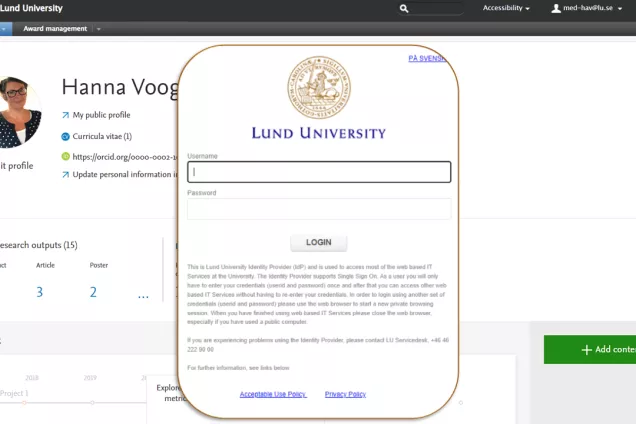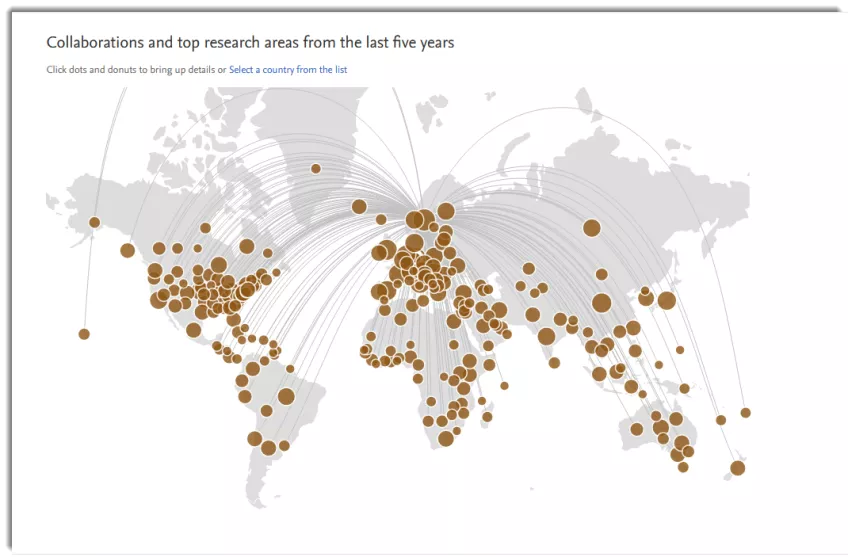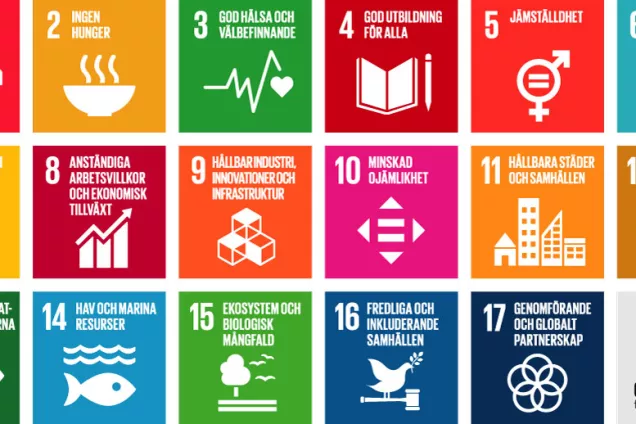Web editors
This page is for you who are a web editor or communications officer at Lund University. On this page you will find information about what you can do in LUCRIS.
Your work is important
You create the interaction between information in LUCRIS (including the Research Portal) and the local websites. As a web editor, it is often you who reuses the information from LUCRIS to other web pages and makes it available to different users. Sometimes you also have tasks in LUCRIS such as updating certain information on selected pages.
It is often you who add images and texts to the organisation's landing page in the portal. You do not update the information yourself but provide it via the LUCRIS support.
How to do it
You need authorization in LUCRIS to be able to update information and there are a number of different roles relevant to you. On the page "Administrate LUCRIS" you will find different roles and what authorization they give. Contact the support if you need an administrative role.
Reuse data
There are different ways for you as a web editor to find and follow our researchers and their research results. An advantage of the Research Portal is that all information is gathered in a single place to facilitate searchability and navigation between different types of information. It gives a good overview of the broadness of Lund University.
Creating links from, and to, the Research Portal can complement different websites without having to double publish the information. There are also other ways to integrate the information from LUCRIS. Below are some examples:
Some faculties have chosen to completely scrap personal web pages for researchers in favour of the Research Portal's personal pages. Others have chosen to keep the personal pages and instead have a direct link from the institution's website to the personal profile page in the portal. Either solution provides an opportunity for visitors on the page to be able to see all information entered into LUCRIS, such as description of research, research output or projects.
A link to the portal's profile page can also be used as references in for instance project applications and reports. For the institutions that use Drupal as a web publishing tool, the link to the researcher's profile page in the Research portal is integrated into the personal page template.
You can also complement a web page with links to avoid having to enter long lists. Link to publication lists for a unit, a project or similar. You can also do thematic searches and link to the results. For example, all researchers at Lund University who work on the topic of cancer and plastics. These links are not static but based on a search string, which enables a constantly updated list of everything that matches the search. We in support are happy to help with this work.
LUCRIS has an API interface ("Application Programming Interface") which makes it possible to reuse all public information about people, research outputs, projects and activities in other contexts, for example for republishing on local websites. Use of the API requires authentication. To get more information about this and access to such an account, email LUCRIS support at: servicedesk [at] lu [dot] se.
What you need
It is possible to republish data on local web pages using RSS feeds. You need the following to display the information on your site:
- An RSS link (a URL to an RSS feed) from the Research portal
- The possibility to add the link in an RSS window (RSS widget) on your website
Assistance with the RSS link
It can be challenging to retrieve the right information in a specific order through RSS feeds. The Research portal's RSS button has its limitations. With some tweaking, you can retrieve RSS feeds for, for example:
- Publications from a person or organisation sorted by publication date
- Projects from a person or organisation sorted by start date
If you need assistance with an RSS link to the Research Portal, please contact support at: servicedesk [at] lu [dot] se.
RSS in Drupal
In Drupal, there is an RSS feature (RSS settings) that you can use once you have obtained your RSS link. Follow these steps:
- Create an "info box."
- Insert your RSS link in the "URL" field under RSS settings at the bottom.
- Choose the number of items (item count) you want to display.
- Check the box for the title.
- Uncheck the box for the date: This date represents when the entry was posted in LUCRIS and can be misleading.
- Choose whether you want a description: This will display both the title, description, and date as the publication date. Since the title will appear twice in the RSS feed, it may be a good idea to uncheck the description field.
RSS on another website
Once you have obtained the RSS link, you will likely need an HTML code to display the RSS feed if there is no built-in RSS function on the page.
If you need assistance with an example of an HTML code, please contact support at: servicedesk [at] lu [dot] se.
Update an organisation’s information
To create a seamless shift between web pages and the Research Portal, you can work with texts and visual language on the landing page for your organisation in the Research Portal.
An organisation in LUCRIS can for instance be: a faculty, a department or a research group. The entire organisational structure is taken from Lucat.
Information that you as a web editor may be responsible for adjusting is:
- The image placed at the top of the page, a so-called Hero image. Size 1920 x 470.
- Organisations can add moving images, such as movies, to present their activity. It is also possible to illustrate with still images (in addition to the so-called Hero-image).
- Descriptive texts in Lucat and LUCRIS.
- Graphics of external collaborations are visible as interactive maps.
You can add a so called ‘Hero-image’ to the organisations start page on the Research Portal. It acts as a background to the information about the unit. The image is entered into LUCRIS by an administrator with a special role. Contact the LUCRIS support to get in touch with the right person within your faculty.
The maps presented at individual and organisational level illustrate external collaborations over the past 5 years. Information about external parties is taken from co-published publications and joint projects.
The size of the interactive rings is in correlation to how many collaborations there are with the given country. In some countries, the data is divided into states, for example.
If the information appears incomplete, it is because all the correct data is not connected in LUCRIS. This can be remedied by going through, for example, the researchers' projects and making sure that external collaboration partners are connected to the right external organization and that the right research outputs are connected to the project.
Hide the collaboration map
If you don't want the collaboration map on your organisation or personal profile, you can hide it:
- At an organisation: by contacting LUCRIS support
- On the personal profile: can be hidden via the person’s personal profile page in LUCRIS
The text that appears under the heading ‘Organisation profile’ is retrieved from Lucat and changed by the person in your organisation who has administration rights in Lucat.
FAQ for web editors
Here you will find our frequently asked questions by web editors.
Changes to people's connections (affiliations) to organisations are made in Lucat. To change which people belong to an organisation in LUCRIS, you must therefore contact your Lucat administrator.
You can find your administratör at lunduniversity.lu.se below the organisation. It is usually written for the larger units such as institutions.
Contact the LUCRIS support
E-mail: servicedesk [at] lu [dot] se
Phone: 046-222 90 00
Monday - Friday 8:00-17:00
Web form: support.lu.se

Log in to LUCRIS
(lucris.lub.lu.se)

Research portal
(portal.research.lu.se)
RSS example
This is an example of how an RSS feed can appear in an info box in Drupal.




